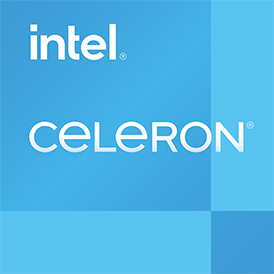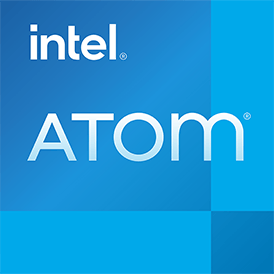
Intel Celeron J1900 vs Intel Atom N2800
Last updated:
CPU comparison with benchmarks

|
 |

|
| Intel Celeron J1900 | Intel Atom N2800 | |
CPU comparisonIn this CPU comparison, we compare the Intel Celeron J1900 and the Intel Atom N2800 and use benchmarks to check which processor is faster.
We compare the Intel Celeron J1900 4 core processor released in Q4/2013 with the Intel Atom N2800 which has 2 CPU cores and was introduced in Q4/2011. |
||
| Intel Celeron (165) | Family | Intel Atom (108) |
| Intel Celeron J1000/N2000 (17) | CPU group | Intel Atom N2000 (3) |
| 6 | Generation | 3 |
| Bay Trail | Architecture | Cedarview |
| Mobile | Segment | Desktop / Server |
| -- | Predecessor | -- |
| -- | Successor | -- |
|
|
||
CPU Cores and Base FrequencyThe Intel Celeron J1900 is a 4 core processor with a clock frequency of 2.00 GHz (2.42 GHz). The processor can compute 4 threads at the same time. The Intel Atom N2800 clocks with 1.86 GHz, has 2 CPU cores and can calculate 4 threads in parallel. |
||
| Intel Celeron J1900 | Characteristic | Intel Atom N2800 |
| 4 | Cores | 2 |
| 4 | Threads | 4 |
| normal | Core architecture | normal |
| No | Hyperthreading | Yes |
| No | Overclocking ? | No |
| 2.00 GHz | Frequency | 1.86 GHz |
| 2.42 GHz | Turbo Frequency (1 Core) | -- |
| 2.42 GHz | Turbo Frequency (All Cores) | -- |
Internal GraphicsGraphics (iGPU) integrated into the processor not only enable image output without having to rely on a dedicated graphics solution, but can also efficiently accelerate video playback. |
||
| Intel HD Graphics (Bay Trail GT1) | GPU | Intel GMA 3600 |
| 0.69 GHz | GPU frequency | 0.40 GHz |
| 0.85 GHz | GPU (Turbo) | -- |
| 7 | GPU Generation | -- |
| 22 nm | Technology | 65 nm |
| 2 | Max. displays | 2 |
| 4 | Compute units | 4 |
| 32 | Shader | 32 |
| No | Hardware Raytracing | No |
| No | Frame Generation | No |
| 2 GB | Max. GPU Memory | 1 GB |
| 11.2 | DirectX Version | 10.1 |
Hardware codec supportA photo or video codec that is accelerated in hardware can greatly accelerate the working speed of a processor and extend the battery life of notebooks or smartphones when playing videos. |
||
| Intel HD Graphics (Bay Trail GT1) | GPU | Intel GMA 3600 |
| No | Codec h265 / HEVC (8 bit) | No |
| No | Codec h265 / HEVC (10 bit) | No |
| Decode / Encode | Codec h264 | No |
| No | Codec VP9 | No |
| No | Codec VP8 | No |
| No | Codec AV1 | No |
| Decode / Encode | Codec AVC | No |
| Decode | Codec VC-1 | No |
| Decode | Codec JPEG | No |
Memory & PCIeUp to 8 GB of memory in a maximum of 2 memory channels is supported by the Intel Celeron J1900, while the Intel Atom N2800 supports a maximum of 4 GB of memory with a maximum memory bandwidth of 8.6 GB/s enabled. |
||
| Intel Celeron J1900 | Characteristic | Intel Atom N2800 |
| DDR3-1333 | Memory | DDR3-1066 |
| 8 GB | Max. Memory | 4 GB |
| 2 (Dual Channel) | Memory channels | 1 (Single Channel) |
| 21.3 GB/s | Max. Bandwidth | 8.6 GB/s |
| No | ECC | No |
| -- | L2 Cache | -- |
| 2.00 MB | L3 Cache | 1.00 MB |
| 2.0 | PCIe version | -- |
| 4 | PCIe lanes | -- |
| 2.0 GB/s | PCIe Bandwidth | -- |
Thermal ManagementThe Intel Celeron J1900 has a TDP of 10 W. The TDP of the Intel Atom N2800 is 6.5 W. System integrators use the TDP of the processor as a guide when dimensioning the cooling solution. |
||
| Intel Celeron J1900 | Characteristic | Intel Atom N2800 |
| 10 W | TDP (PL1 / PBP) | 6.5 W |
| -- | TDP (PL2) | -- |
| -- | TDP up | -- |
| -- | TDP down | -- |
| 100 °C | Tjunction max. | -- |
Technical detailsThe Intel Celeron J1900 has 2.00 MB cache and is manufactured in 22 nm. The cache of Intel Atom N2800 is at 1.00 MB. The processor is manufactured in 32 nm. |
||
| Intel Celeron J1900 | Characteristic | Intel Atom N2800 |
| 22 nm | Technology | 32 nm |
| Monolithic | Chip design | Monolithic |
| x86-64 (64 bit) | Instruction set (ISA) | x86-64 (64 bit) |
| SSE4.1, SSE4.2 | ISA extensions | SSE3 |
| BGA 1170 | Socket | BGA 559 |
| VT-x, VT-x EPT | Virtualization | None |
| No | AES-NI | No |
| Windows 10, Linux | Operating systems | Windows 10, Linux |
| Q4/2013 | Release date | Q4/2011 |
| 35 $ | Release price | 50 $ |
| show more data | show more data | |
Rate these processors
Average performance in benchmarks
⌀ Single core performance in 2 CPU benchmarks
⌀ Multi core performance in 3 CPU benchmarks
Geekbench 5, 64bit (Single-Core)
Geekbench 5 is a cross plattform benchmark that heavily uses the systems memory. A fast memory will push the result a lot. The single-core test only uses one CPU core, the amount of cores or hyperthreading ability doesn't count.
|
|
Intel Celeron J1900
4C 4T @ 2.42 GHz |
||
|
|
Intel Atom N2800
2C 4T @ 1.86 GHz |
||
Geekbench 5, 64bit (Multi-Core)
Geekbench 5 is a cross plattform benchmark that heavily uses the systems memory. A fast memory will push the result a lot. The multi-core test involves all CPU cores and taks a big advantage of hyperthreading.
|
|
Intel Celeron J1900
4C 4T @ 2.42 GHz |
||
|
|
Intel Atom N2800
2C 4T @ 1.86 GHz |
||
Geekbench 6 (Single-Core)
Geekbench 6 is a benchmark for modern computers, notebooks and smartphones. What is new is an optimized utilization of newer CPU architectures, e.g. based on the big.LITTLE concept and combining CPU cores of different sizes. The single-core benchmark only evaluates the performance of the fastest CPU core, the number of CPU cores in a processor is irrelevant here.
|
|
Intel Celeron J1900
4C 4T @ 2.42 GHz |
||
|
|
Intel Atom N2800
2C 4T @ 1.86 GHz |
||
Geekbench 6 (Multi-Core)
Geekbench 6 is a benchmark for modern computers, notebooks and smartphones. What is new is an optimized utilization of newer CPU architectures, e.g. based on the big.LITTLE concept and combining CPU cores of different sizes. The multi-core benchmark evaluates the performance of all of the processor's CPU cores. Virtual thread improvements such as AMD SMT or Intel's Hyper-Threading have a positive impact on the benchmark result.
|
|
Intel Celeron J1900
4C 4T @ 2.42 GHz |
||
|
|
Intel Atom N2800
2C 4T @ 1.86 GHz |
||
iGPU - FP32 Performance (Single-precision GFLOPS)
The theoretical computing performance of the internal graphics unit of the processor with simple accuracy (32 bit) in GFLOPS. GFLOPS indicates how many billion floating point operations the iGPU can perform per second.
|
|
Intel Celeron J1900
Intel HD Graphics (Bay Trail GT1) @ 0.85 GHz |
||
|
|
Intel Atom N2800
Intel GMA 3600 @ 0.40 GHz |
||
Estimated results for PassMark CPU Mark
Some of the CPUs listed below have been benchmarked by CPU-monkey. However the majority of CPUs have not been tested and the results have been estimated by a CPU-monkey’s secret proprietary formula. As such they do not accurately reflect the actual Passmark CPU mark values and are not endorsed by PassMark Software Pty Ltd.
|
|
Intel Celeron J1900
4C 4T @ 2.42 GHz |
||
|
|
Intel Atom N2800
2C 4T @ 1.86 GHz |
||
Cinebench R20 (Single-Core)
Cinebench R20 is the successor of Cinebench R15 and is also based on the Cinema 4 Suite. Cinema 4 is a worldwide used software to create 3D forms. The single-core test only uses one CPU core, the amount of cores or hyperthreading ability doesn't count.
|
|
Intel Celeron J1900
4C 4T @ 2.42 GHz |
||
|
|
Intel Atom N2800
2C 4T @ 1.86 GHz |
||
Cinebench R20 (Multi-Core)
Cinebench R20 is the successor of Cinebench R15 and is also based on the Cinema 4 Suite. Cinema 4 is a worldwide used software to create 3D forms. The multi-core test involves all CPU cores and taks a big advantage of hyperthreading.
|
|
Intel Celeron J1900
4C 4T @ 2.42 GHz |
||
|
|
Intel Atom N2800
2C 4T @ 1.86 GHz |
||
Cinebench R15 (Single-Core)
Cinebench R15 is the successor of Cinebench 11.5 and is also based on the Cinema 4 Suite. Cinema 4 is a worldwide used software to create 3D forms. The single-core test only uses one CPU core, the amount of cores or hyperthreading ability doesn't count.
|
|
Intel Celeron J1900
4C 4T @ 2.42 GHz |
||
|
|
Intel Atom N2800
2C 4T @ 1.86 GHz |
||
Cinebench R15 (Multi-Core)
Cinebench R15 is the successor of Cinebench 11.5 and is also based on the Cinema 4 Suite. Cinema 4 is a worldwide used software to create 3D forms. The multi-core test involves all CPU cores and taks a big advantage of hyperthreading.
|
|
Intel Celeron J1900
4C 4T @ 2.42 GHz |
||
|
|
Intel Atom N2800
2C 4T @ 1.86 GHz |
||
Devices using this processor |
|
| Intel Celeron J1900 | Intel Atom N2800 |
| Unknown | Unknown |
Popular comparisons containing this CPUs
back to index








